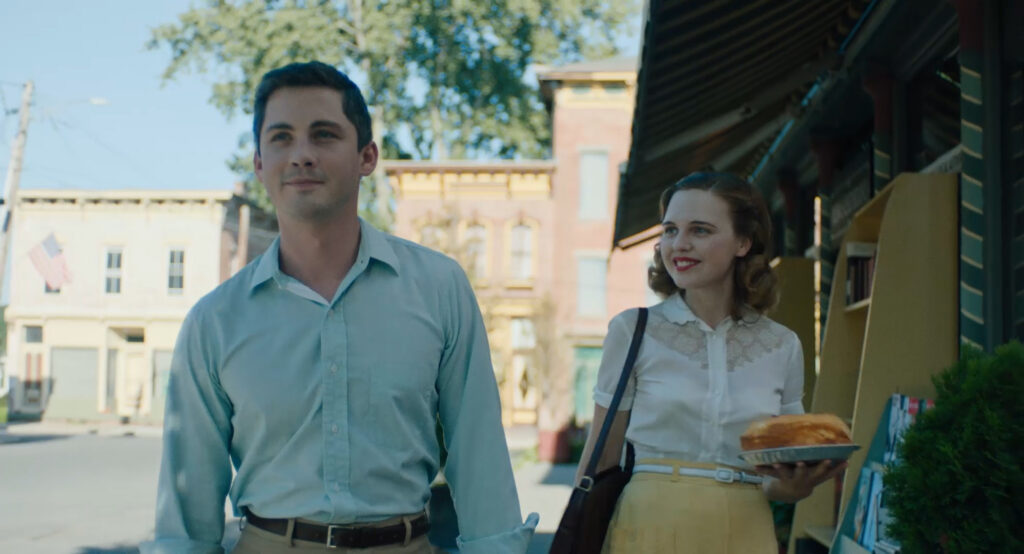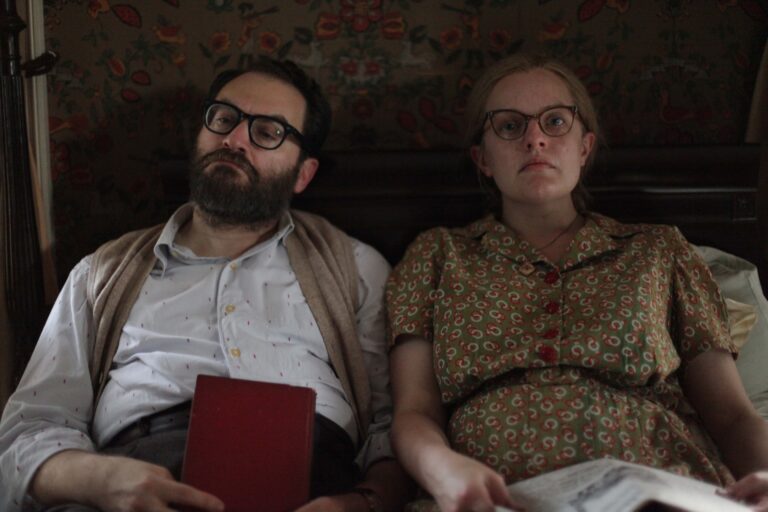Shirley (2020 | United States | 107 minutes | Josephine Decker)
In her new film the actor, director, and performance artist Josephine Decker (Madeline’s Madeline) has made less a biopic than a lucid emotional portrait of renowned horror writer Shirley Jackson. Based in part on Susan Scarf Merrell’s novel of the same title, the film instead locates the story in Bennington, Vermont around 1950, soon after the world-rattling publication in the New Yorker of “The Lottery“, her then-controversial (and now enshrined in high school syllabi around the world) short story. The author, in the throes of a seemingly agoraphobic depression, overmedicated, and on the precipice of her next novel, is evoked spectacularly by Elisabeth Moss is frazzled hair and glasses, an ever turbulent storm of jittery suspicion and a preternaturally perceptive provocateur.
Our window into the life of Jackson and her husband Stanley Heyman (a boisterous, bearded, and bespectacled Michael Stuhlbarg as a college professor who thrives, perhaps a little too much, on the rapturous attention of his students) comes by way of a newly-married couple who somewhat unexpectedly become boarders in their home. Fred (Logan Lerman, suitably bland here), is a recent PhD who’s moved to the college town to assist Stanley; his wife Rose (Odessa Young, with captivating restraint) expects to audit some courses at the college but is quickly drawn into Shirley’s services. Her marriage and unplanned pregnancy cut her own studies short, but it turns out that she’s in for an education of a different sort in the long months spent home alone with Jackson.

Fred and Rose arrive in Bennington by train (she instigates an Amtrak bathroom quickie, shorthanding their marital dynamic) to find an academic bacchanalia in progress at the ivy-covered writer’s residence. Stanley in laurels is a flurry of constant motion eager to please guests outside; Shirley holds court amid curious, intimidated, and adoring onlookers in a back room.
By morning, though, the mood has shifted to anxious claustrophobia. Decker films the creaking old house washed in green light, all ominous angles peeking through doorways and hovering around sun-blocking drapes. Once roused from sleep, Shirley reveals herself to be something of a beastly shit-stirrer, presiding over the household with no tolerance for anyone who doesn’t bend to her will or accommodate her eccentricities. This is the territory where Elisabeth Moss thrives: conveying a mix of fury and vulnerability, the electricity of genius, an immense effort to maintain composure coupled with the great pleasure of causing others to lose theirs. As such, the most favored sport of the Jackson-Heyman household is an equal opportunity dinnertime game of getting under the skin of their guests, scoring points by inflaming self-doubts and setting up psycho-drama in the bedroom, somewhere between a hazing and an antagonistic seduction.

Its in this prickly milieu that Rose falls into a role as Shirley’s caretaker, spy, research assistant, foil, and source of inspiration as Jackson embarks on what will become Hangsaman, a novel inspired by the disappearance of a young co-ed who never returned from a long winter walk. It’s Elisabeth Moss’s showcase, but Young shows enough depth simmering behind Rose’s quiet complaint personality that we believe that Shirley would find something interesting in her new companion. Although there are sub-plots about intrigues of academia and infidelity, the film’s primary interest lies in conveying the isolation and agony of the creative process. The taxing process of constructing the story unfold through intertwined bouts of frustration, tendrils of memory, and fantastical projections of storytelling untethered from reality.
With the jumble of timelines and invented characters, Shirley is not for anyone hoping for historical re-enactment, but it’s an exceptional and visually engaging mood piece anchored by Moss’s phenomenally nervy lead performance. It should also be celebrated for a depiction of writing that feels like one of the less clichéd and unglamorous in recent memory. There’s rarely a convenient spark of inspiration or flurry of exceptional progress, just agonies of the long slog of facing the typewriter and confronting the dread of the outside world’s dressing rooms, townspeople, and atrocious faculty parties. This outlook, coupled with the constant psychological gamesmanship, lends a unsettling thrill to the journey toward the novel’s eventual completion. It’s not until late in game, as the atmospheric soundtrack takes a turn toward a major key, that we realize that we’ve been following a slow sensational build to twin triumphs of authorship, invention, and engineering. To Moss’s credit, her enigmatic smile leaves just enough doubt to question which the writer prizes more.
Shirley is now playing on Hulu or via Neon’s virtual cinema partnerships with local theaters, including Northwest Film Forum (who will be donating all proceeds from this month’s screenings to organizations that empower the Black community).



